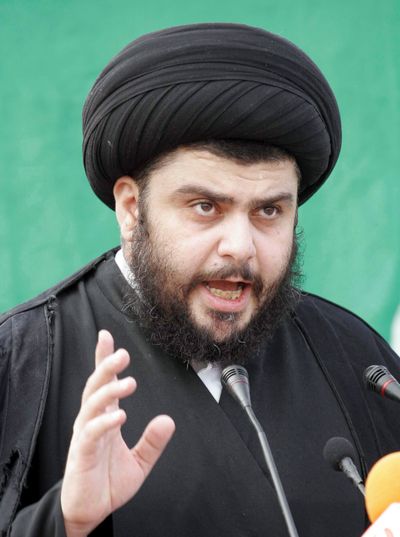Cleric vows new attacks if troops stay in Iraq
Threat aimed at halting talks on extending U.S. training

BAGHDAD – A powerful anti-American Shiite cleric in Iraq with thousands of loyal followers threatened on Sunday that U.S. forces who stay past the Dec. 31 withdrawal deadline are fair game to attack.
Iraqi officials, worried about a potential backlash if U.S. troops remain in the country, have tried to portray any American force that does not withdraw as trainers of the still-growing Iraqi military rather than as combat troops.
While the security situation in Iraq has improved over the past few years, attacks are still commonplace. In June alone, 15 U.S. soldiers were killed, making it the bloodiest month for the U.S. military in Iraq in two years. Nearly all of them were killed in attacks by Shiite militias bent on forcing out American troops on schedule.
Muqtada al-Sadr’s comments suggested that even a limited training mandate would not be acceptable to his Shiite militia, which has stepped up rocket and bomb attacks against American forces as the December deadline approaches.
“They will be treated as anyone who stays in Iraq, as a tyrannical occupier that must be resisted by military means,” al-Sadr said in a statement on his website.
His comments follow last week’s decision by Iraqi government to open talks with Washington to discuss keeping a number of American forces in the country.
Al-Sadr’s latest statement was also aimed at Iraqi political leaders, particularly Prime Minister Nouri al-Maliki.
“The government which agrees to them staying, even if it is for training, is a weak government,” al-Sadr said.
The prime minister and al-Sadr have clashed in the past, and in 2008 al-Maliki sent his forces, with American help, into the southern city of Basra and eastern Baghdad to crush al-Sadr’s militia.
But al-Sadr, under heavy Iranian pressure, backed al-Maliki last fall when the prime minister was in a tough re-election contest against a Sunni-supported rival.
Al-Sadr’s support helped the prime minister secure a second term.